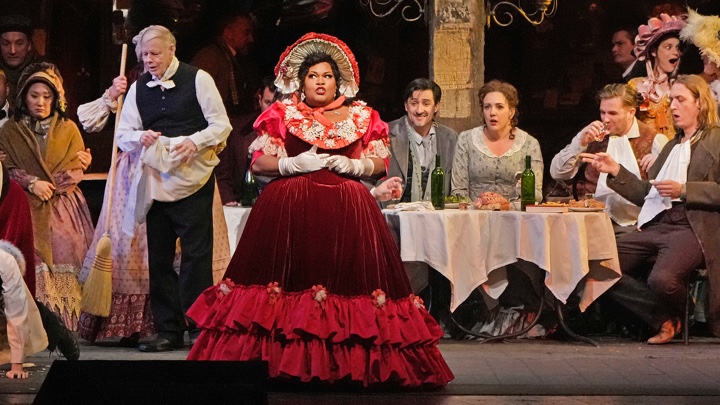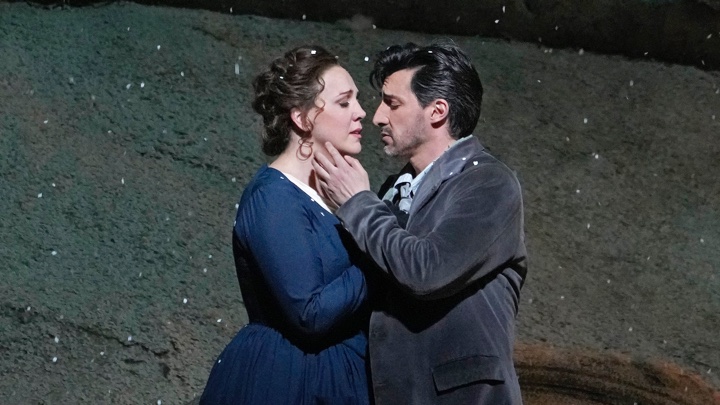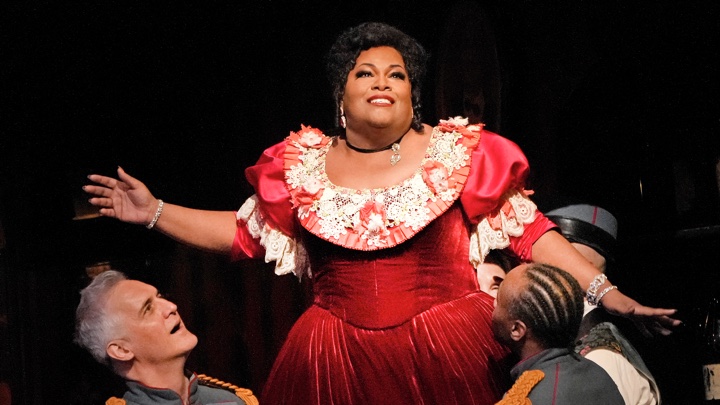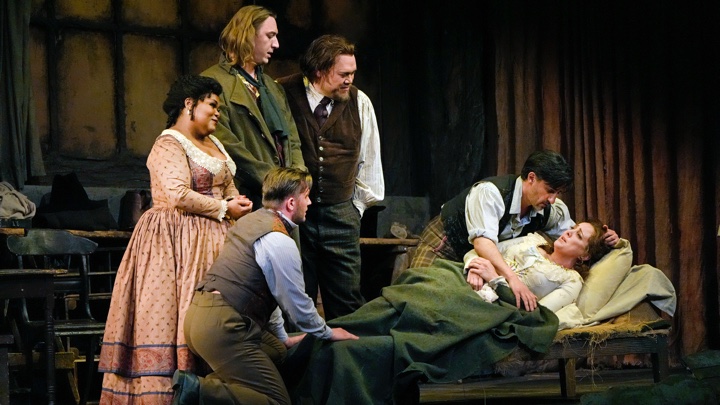

But the Met’s latest cast of “Bohemians” (who took to the stage on Friday night) were like a breath of fresh air, gently wafting the settling dust off this operatic relic. I don’t really expect to be surprised by a performance of La bohème at the Met. Yet, this cast found untapped potential in Zeffirelli’s ultra-conservative scenic vision, finding the distinctly human story in amongst all the bloated spectacle.
Indeed, this revival was bursting with fleeting, seemingly spontaneous dramatic garnishes—thoughtful subtleties that lifted the energy (and magnified the emotional impact) of this production.
This renewed expressivity resulted, in part, from the committed individual performances of this latest cast—which featured successful role debuts for Susanna Phillips and Latonia Moore.
But it was also the product of a palpable theatrical chemistry that ran throughout the ensemble. I felt a real emotional connection between singers, a powerful sense that these were actual people speaking to each other, rather than performers hamming it to their audience.
Friday’s cast brought Puccini’s characters to us as fully fleshed-out human beings, with complex personalities rooted in the nuances of the opera’s libretto.
Schaunard, Colline, and Marcello—who so often appear as interchangeable zanni—found distinct identities in the hands of Iurii Samoilov, Krysztof B?czyk, and Quinn Kelsey respectively. The rambunctious shenanigans between these starving artists did not feel like so much comic relief, emerging, instead, as a moving testament to the endurance of the human spirit in the face of adversity.
Likewise, Phillips and Charles Castronovo brought interesting personality tics to their interpretations of Mimì and Rodolpho. By focusing on the individuality of their respective characters, they demonstrated what an odd couple these lovers are—that their relationship flourishes in spite of (and not because of) the differences between them.
Phillips and Castronovo did not romanticize the love between the two protagonists. They didn’t shy away from their characters’ flaws, and, indeed, relished in the toxic magnetism at the heart of their on-again-off-again affair.
That there was clear tension between Castronovo’s roguish, freewheeling Rodolfo and Phillips’s painfully earnest Mimì did not diminish the raw passion of their relationship. Nor did it dampen the emotional impact of the opera’s tragic end. If anything, this warts-and-all portrayal of their relationship felt their story seem all the more real, all the more close-to-home.
Musically, the performance was far from perfect: there were aspects of this interpretation that just didn’t cohere, only held together by the strength of the dramatic reading.
Leading the orchestra, James Gaffigan brought out bold contrasts in Puccini’s score. Musical events often seemed to erupt from nowhere, punctuating the onstage action with sudden bursts of sonic energy.
Gaffigan relished in the modernity of Puccini’s score, balancing surging post-Wagnerian tension with a welcome sense of spontaneity. Under his baton, parts of the opera almost sounded jazzy: the chromatic woodwind arabesques which Puccini often deploys as countermelodies emerged from the orchestra as sultry riffs—aching, quasi-improvisatory gestures responding to the vicissitudes of the drama.
However, the orchestra often sounded out of step with the singers. I didn’t get the sense that there was a unified approach to the pace of Puccini’s score between the singers and the orchestra: points of cadential arrival often felt a little uncoordinated, fermatas seemed tentative or rushed, and there seemed to be a little disagreement over the timing of rubato.
Similarly, there many moments where a delicate vocal pianissimo was met with a vigorous swell from the orchestra, totally overpowering the singers. There were times when I felt like the singers were merely a backdrop—a gentle accompaniment—to the orchestral texture.
While this was not always a bad thing (I gained a new appreciation for Puccini’s orchestrations), it often meant that little vocal nuances (portamenti, messa di voce) were swallowed up by the instruments. Neither Phillips nor Castronovo has a particularly large voice, and I would’ve appreciated a musical interpretation that was better tailored to the voices of the singers and their particular vocal stylings.
Phillips—once a mainstay Musetta in this production—made a particularly elegant debut in the role of Mimì. Hers was a slow-burning interpretation. Her aria and duets in the first act sounded almost guarded, as if she were deliberately holding back.
By the third act, however, it became clear exactly what she was holding back: a raw, unbridled vocal performance that perfectly captured the anguish and desperation of the dying Mimì. I was holding back tears at the moment when her Mimì emerged from the shadows to confront the jealous Rodolpho: in the ensuing duet, Phillips found warmth and elegance in Mimì’s torrid, agonized outpourings.
This is not to say that Phillips’s performance was overblown. Indeed, the soprano was at her best when she explored different shades of piano within the melodic line. If her high notes could be a little colorless in the louder moments, the even lyricism of her middle register never failed to draw me in.
Castronovo’s Rodolpho, too, initially felt a tad withheld. The tenor played down Puccini’s grand, soaring melodic apexes, prioritizing, instead, the smoothness of the musical line and an even, finessed vocal production.
This restraint paid dividends in those moments when his Rodolfo did “let it rip”: in moments of dramatic intensity, Castronovo’s sweet-voiced bel canto opened into a lustrous, full-throated roar, bringing new energy to the character.
If anything, Castronovo’s Rodolfo was a little too lyrical. I wish that his early scenes with Marcello, Colline, and Schaunard had been more sharply articulated: often, his outwardly mellifluous vocality was altogether too smooth for the quick-fire parlando of the comic action.
Latonia Moore proved a natural Musetta: campy, but not overblown; flirtatious, but never shallow; warmhearted, but with a playful edge.
She made much of her grand entrance in the second act, toying with the extremes of Musetta’s vocal line: the laughs and shrieks which pepper her music in this act never compromised the richness of her sound, nor did they detract from the musicality of her interpretation.
That being said, I felt that her “Quando m’en vo” was a little too blustery, lacking the kind of ironic restraint that often makes this moment so magical. In fact, my favorite part of her performance was Musetta’s prayer in the final act (a deeply underrated musico-dramatic conceit on Puccini’s part) which laid bare the sumptuous soft edges of her voice.
Kelsey’s Marcello was a particular highlight for me: he played the struggling artist as a gruff curmudgeon, endlessly frustrated by his artistic and romantic failings.
He took a firm, forthright approach to Marcello’s music; however, this robust, no-nonsense singing did not make his character any less nuanced or interesting. If anything, it created a nice contrast to the hearty, boisterous performances of Samoilov and B?czyk
Alexandra Wilson, in her book-length study of Puccini’s opera, aptly notes that the endless revivals of Zeffirelli’s production have gained a “ritualistic quality”—more a product of tradition than artistic necessity. But I’m beginning to think that, as long as we have intelligent, passionate artists willing to pump new life into this nostalgia piece, there will always be something new to discover in the Met’s La bohème.
Photos: Ken Howard / Met Opera




























Comments